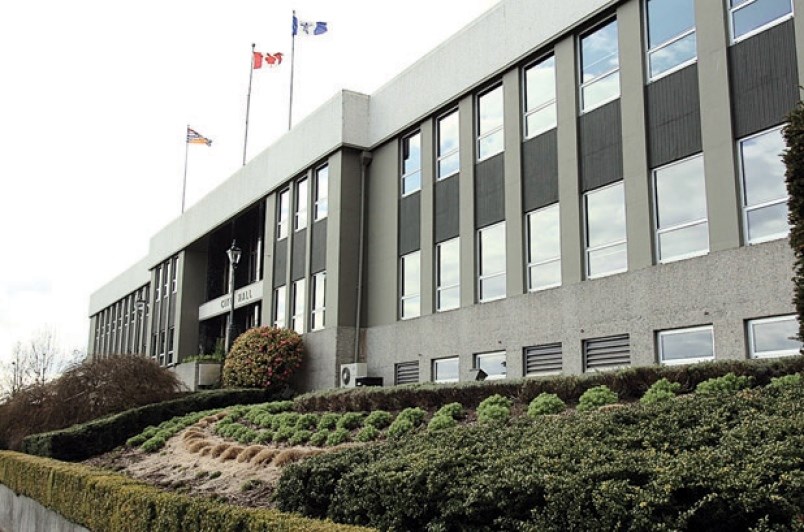Hybrid meetings are in, but outdated language like Your Worship will soon be out at New West council meetings.
Council recently gave three readings to amendments to the city’s procedure bylaw. One of the changes will allow council, as well as the city’s advisory committees and commissions, to hold electronic and hybrid meetings (where some members are attending in person and others are attending virtually) long after the pandemic ends.
Coun. Mary Trentadue supported the move to make hybrid meetings a permanent offering for city meetings.
“Because I have a cold, I am very glad to not to be at council tonight coughing and sneezing all over all of you, and I can still participate from home,” she said at the Oct. 4 meeting. “I am really happy to see that we are going to continue with hybrid meetings so that in the circumstance where someone needs to be at home they can still participate, whether it’s a councillor, a mayor, a staff person or even a resident. I am really supportive of that and want to thank staff for making that happen. I know the technology is not always perfect but I really appreciate how hard we have worked at this.”
In response to the COVID-19 pandemic, the province adopted a ministerial order that allowed city council meetings to be held electronically. Recent changes to the Community Charter now allow for fully electronic or hybrid meetings to continue, provided council change the city’s procedure bylaw.
Although hybrid meetings will be allowed, a staff report states that meetings with a full council physically present will take place at least six times per year, “in the interests of fostering council cohesion.”
Council is scheduled to consider adoption of the bylaw on Oct. 18.
Changes to delegations
The proposed amendments to the procedure bylaw also include changes designed to modernize the language in council agendas. Instead of “public delegations”, people who address council will now be referred to as “speakers.”
Up to 10 speakers will be heard at each council meeting when there is not a public hearing or an “opportunity to be heard” on a specific issue.
Before the pandemic, speakers could show up in council chambers before a meeting and sign up to speak, but that’s no longer the case. Now, speakers must pre-register to speak at meetings, either in-person or electronically, by noon on the day of the council meeting.
In a report presented to council earlier this year, staff said the COVID-19 pandemic provided time for the city to pilot a new open delegation process, which allowed up to 10 speakers to sign up before the first regular council meeting of each month. The report said the signup process allows legislative services staff to support the public by providing technical support and ensuring each speaker feels comfortable addressing council.
“In signing up, speakers had to advise the topic they were going to speak on. This allowed staff to organize speakers by topic, and made it possible for staff who are knowledgeable about those topics to be available for the meeting,” said the report. “This process also clarified the time required for open delegations. Requests to speak did not exceed 10 per meeting throughout the pandemic.”
No more outdated language
Other proposals will change some of the “outdated” language in the procedure bylaw. In order to emphasize inclusivity and accessibility, staff recommend terms like Your Worship, Mr. Mayor or Madam Mayor be removed in favour of terms like mayor, chair and councillor.
Trentadue supported the changes, but said she’d like council and staff to further discuss the use of honorifics at council meetings.
“I would actually like to add an amendment to this motion to ask staff to go back and do a bit more work on how we might remove the honorifics that we use in our communicating with each other; that is, referring to the mayor, councillor, any sort of designation that implies a hierarchy,” she said. “I am really interested in making our meetings be much more inclusive, and normalize them in a way that everyone feels comfortable and that we don’t all have different names that we go by. I would just like to have a conversation with council about this and I would also like to have staff report back on how possible that would be in the Community Charter.”
Council approved a motion to have staff report back on the issue of honorifics.
Assistant city clerk told council staff would report back on the removal of honorifics in the new year, after having time to fully analyze the Community Charter and see if that can be done.
For now, the changes don’t impact the way members of the public need to address council.
“With regards to modernizing the language, this refers currently to how council and staff address each other during the meeting,” said city clerk Jacque Killawee in an email to the Record. “This will be further explored when staff respond to Coun. Trentadue’s motion.”
Follow Theresa McManus on Twitter @TheresaMcManus
Email [email protected]




